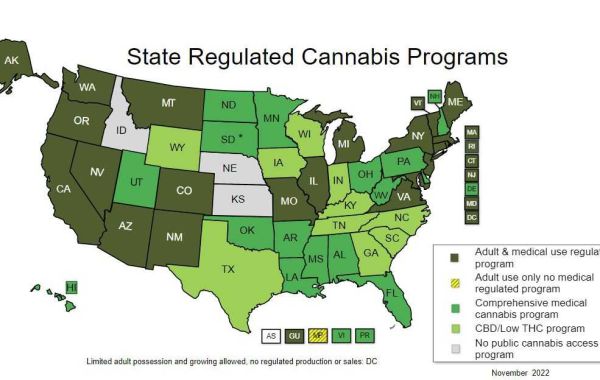The following article was written by film review writing service
Governments of different American states have been discussing the issue of marijuana legalization for several decades. Nowadays, the use of cannabis is decriminalized in about twenty states and the District of Columbia, although it is forbidden according to federal law. Researchers and medical workers have different views on the issue of cannabis legalization and its legal distribution and raise doubts about cannabis effect on the youth and adults. Doctors state that cannabis is a very effective medicine, although it is a drug that causes addiction. Besides medical efficiency, there are other benefits of marijuana legalization such as legal revenue from medical marijuana sale and a decrease of the shadow weed market. Therefore, medical marijuana use among adult patients should be legalized but allowed exclusively on condition of doctor’s prescription and strict control over its use.
Medical marijuana contains two chemicals, delete-9-tetrahydrocannabinol (THC) and cannabidiol (CBD), which make it important in the treatment of different diseases and disorders. Doctors use cannabinoids in medicine for different purposes such as decreasing nausea, vomiting, pain, and inflammation as well as improvement of appetite. The proponents of the legalization of marijuana emphasize the benefits of the usage of medical marijuana for the treatment of several conditions in a safe manner, such as chronic pain control, nausea/vomiting, loss of appetite, and seizure control, to mention a few (Porche, 2013). Researchers also state that marijuana use is important for patients suffering from epilepsy, Crohn's disease, neuropathic pain, and posttraumatic stress disorders. Cannabis also helps to treat intraocular pressure in glaucoma, muscle spasticity which arises from multiple sclerosis as well as a Dravet syndrome, slow down the progression of Alzheimer’s and Parkinson’s diseases, improve patient’s condition in case of hepatitis C, AIDS, an autoimmune disorder, etc. Furthermore, cannabis may prevent the progression of cancer. Thus, doctors believe that marijuana legalization for medical use is justified as this drug improves the health condition of patients.
However, despite its positive effects on patient’s health, cannabis has numerous side effects. Short-term side effects of marijuana include panic, hallucinations, longer reaction time, and problems with coordination. Although medical marijuana is less addictive than alcohol, it still has a negative impact on the health. For instance, it can cause accidental poisoning, anxiety, cognitive impairment, dependence, respiratory diseases, cardiovascular problems, mental illnesses, etc. (Caulkins Kilmer, 2016). Despite the overall idea of cancer prevention with the help of the weed, researchers believe that cannabis smoking may lead to the development of prostate and testicular cancer. Furthermore, “during intoxication, marijuana can interfere with cognitive function and motor function, and these effects can have detrimental consequences” (Volkow, Baler, Compton, Weiss, 2014). Moreover, the researchers argue that the repeated use of cannabis during adolescence has a negative impact on brain functioning and jeopardizes educational, professional, and social achievements (Volkow et. at, 2014). The use of marijuana in early pregnancy increases the risk of miscarriage, premature birth or stillbirth. Moreover, it has a negative impact on infant development and may lead to low birth weight, altered brain development, etc. Although the impact of cannabis use on a child during breastfeeding requires deeper studying, doctors tend to believe that marijuana should not be prescribed to nursing women and children.
Passing laws on marijuana, legislators take into consideration not only its health effects but also other consequences of marijuana legalization. Researchers believe that the legalization of medical marijuana will decrease organized networks of illegal marijuana distribution. Weed legalization may reduce the number of weed networks, making drug trade less profitable because of marijuana legalization for medical purposes and, as a result, its availability on the market. Wide legal distribution of cannabis will positively impact its quality, enabling legislative bodies to develop a framework to control the safety and quality of cannabis, especially when it concerns potentially toxic ingredients. Rutsch (2015) states that bacteria and fungi can grow anywhere, including marijuana buds, which means that marijuana products contain them. Thus, control over marijuana production will improve the quality of the drug and make its use safer for patients who really need it. Moreover, legalization of marijuana will make its illegal distribution unprofitable because of lower prices for the drug and a decrease in revenues from its sale. In addition, it will replenish the treasury of the state with additional costs from marijuana production and sale. Alan Pyke indicates that states which have legalized cannabis receive much revenue from its sale. To prove his idea, the researcher gives the example of Colorado, where “tax revenues from recreational marijuana sales in the calendar year 2014 came in significantly under what was predicted, but the state still netted upwards of $70 million from recreational, medical, and business license taxes in that first year” (Pyke, 2015). These costs may help the government to fight crime and reduce drug sale on the black market. In such a way, marijuana legalization will replenish budget with costs for its production and fight against criminals and will help to improve the safety of medical cannabis.
The issue of marijuana legalization remains the coin with two sides, which should be carefully studied before passing any legislation. Decriminalization of marijuana will make it widely-available, which is very important for those who need it for medical purposes such as to relief pain and decrease symptoms. On the other hand, cannabis legalization will make it widely available to consumers who tend to abuse it, which may have a negative effect on society. Nevertheless, marijuana decriminalization will replenish the budget, so the government will receive additional costs for its production, quality control, and distribution as well as for fight with criminals. Marijuana decriminalization is possible only for medical use with strict supervision of its prescription and use.







